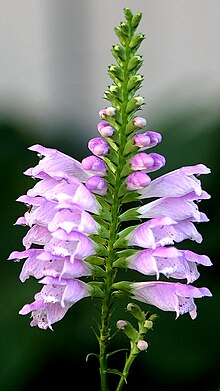Physostegia virginiana, the obedient plant, obedience or false dragonhead,[2] is a species of flowering plant in the mint family, Lamiaceae. It is native to North America, where it is distributed from eastern Canada to northern Mexico.[2] Physostegia are known commonly as obedient plants because a flower pushed to one side will often stay in that position.[3] The name “false dragonhead” refers to the dragonheads of the related Dracocephalum,[3] a genus to which the plant once belonged.[1]
| Physostegia virginiana | |
|---|---|

| |
| Scientific classification | |
| Kingdom: | Plantae |
| Clade: | Tracheophytes |
| Clade: | Angiosperms |
| Clade: | Eudicots |
| Clade: | Asterids |
| Order: | Lamiales |
| Family: | Lamiaceae |
| Genus: | Physostegia |
| Species: | P. virginiana
|
| Binomial name | |
| Physostegia virginiana (L.) Benth.
| |
Description edit
It is a rhizomatous herbaceous perennial producing clumps of stiff, squared stems 2–4 ft (0.61–1.22 m) tall. The leaves are lanceolate and toothed. The inflorescence is a long, dense raceme containing many tubular pink flowers which resemble snapdragons. The open fruit is shaped like a vase and contains four triangular, black seeds.
Taxonomy edit
There are two recognized subspecies. They are:
- Physostegia virginiana ssp. praemorsa - Widespread farther south, to Texas and New Mexico.[4] It has larger flowers, with sterile bracts below the inflorescence, and lacks rhizomes. It is typically found in dry upland sites such as prairies and glades.[5][6]
- Physostegia virginiana ssp. virginiana - Found farther north and west.[4] It has smaller flowers that lack sterile bracts. It is patch-forming from rhizomes. It is typically found in wetter habitats, such as streambanks and bottomlands.[5][6]
Cultivars of P. virginiana often do not fit well into either of the two varieties and are intermediate in characters. They are thought to have originated from hybridization between the two subspecies.[5][6]
Cultivation edit
It is considered a good plant for adding late-season flowers to a garden. Fertile soils produce robust growth and wide spreading, and the plant may require staking. When it grows tall it has a "tendency toward floppiness" that can be controlled with pruning. It can be aggressive and dominate a landscape.[3]
Cultivars edit
Several cultivars have been bred for color variety.[7] Some (agm) have earned the Royal Horticultural Society's Award of Garden Merit.[8]
Cultivars include.
References edit
- ^ a b Physostegia virginiana. NatureServe. 2012.
- ^ a b "Physostegia virginiana". Germplasm Resources Information Network. Agricultural Research Service, United States Department of Agriculture. Retrieved 14 January 2018.
- ^ a b c Physostegia virginiana. Missouri Botanical Garden.
- ^ a b Physostegia virginiana. USDA PLANTS.
- ^ a b c Yatskievych, George (2013). Flora of Missouri, Volume 3. Missouri Botanical Garden Press. p. 356.
- ^ a b c Alan Weakley (2015). "Flora of the Southern and Mid-Atlantic States".
- ^ Physostegia virginiana. Archived 2010-07-29 at the Wayback Machine Michigan State University Extension.
- ^ "AGM Plants - Ornamental" (PDF). Royal Horticultural Society. July 2017. p. 78. Retrieved 25 April 2018.
- ^ "RHS Plant Selector - Physostegia virginiana 'Summer Snow'". Retrieved 6 February 2021.
- ^ "RHS Plant Selector - Physostegia virginiana 'Vivid'". Retrieved 6 February 2021.
External links edit
- Physostegia virginiana (L.) Benth. ITIS.
- Physostegia virginiana. Floridata.
